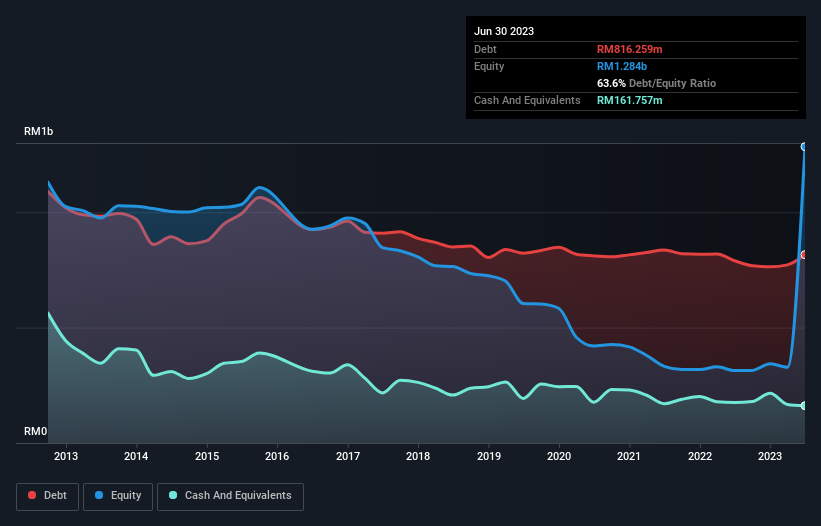- Malaysia
- /
- Industrials
- /
- KLSE:MUIIND
Is Malayan United Industries Berhad (KLSE:MUIIND) Using Debt In A Risky Way?
Warren Buffett famously said, 'Volatility is far from synonymous with risk.' When we think about how risky a company is, we always like to look at its use of debt, since debt overload can lead to ruin. We note that Malayan United Industries Berhad (KLSE:MUIIND) does have debt on its balance sheet. But the more important question is: how much risk is that debt creating?
What Risk Does Debt Bring?
Debt assists a business until the business has trouble paying it off, either with new capital or with free cash flow. In the worst case scenario, a company can go bankrupt if it cannot pay its creditors. While that is not too common, we often do see indebted companies permanently diluting shareholders because lenders force them to raise capital at a distressed price. Having said that, the most common situation is where a company manages its debt reasonably well - and to its own advantage. The first thing to do when considering how much debt a business uses is to look at its cash and debt together.
See our latest analysis for Malayan United Industries Berhad
What Is Malayan United Industries Berhad's Debt?
As you can see below, Malayan United Industries Berhad had RM816.3m of debt, at June 2023, which is about the same as the year before. You can click the chart for greater detail. However, it also had RM161.8m in cash, and so its net debt is RM654.5m.

How Healthy Is Malayan United Industries Berhad's Balance Sheet?
The latest balance sheet data shows that Malayan United Industries Berhad had liabilities of RM858.6m due within a year, and liabilities of RM503.7m falling due after that. Offsetting this, it had RM161.8m in cash and RM184.8m in receivables that were due within 12 months. So it has liabilities totalling RM1.02b more than its cash and near-term receivables, combined.
This deficit casts a shadow over the RM209.7m company, like a colossus towering over mere mortals. So we'd watch its balance sheet closely, without a doubt. After all, Malayan United Industries Berhad would likely require a major re-capitalisation if it had to pay its creditors today. There's no doubt that we learn most about debt from the balance sheet. But it is Malayan United Industries Berhad's earnings that will influence how the balance sheet holds up in the future. So when considering debt, it's definitely worth looking at the earnings trend. Click here for an interactive snapshot.
In the last year Malayan United Industries Berhad wasn't profitable at an EBIT level, but managed to grow its revenue by 42%, to RM482m. Shareholders probably have their fingers crossed that it can grow its way to profits.
Caveat Emptor
While we can certainly appreciate Malayan United Industries Berhad's revenue growth, its earnings before interest and tax (EBIT) loss is not ideal. Indeed, it lost a very considerable RM27m at the EBIT level. If you consider the significant liabilities mentioned above, we are extremely wary of this investment. Of course, it may be able to improve its situation with a bit of luck and good execution. Nevertheless, we would not bet on it given that it vaporized RM862k in cash over the last twelve months, and it doesn't have much by way of liquid assets. So we think this stock is risky, like walking through a dirty dog park with a mask on. There's no doubt that we learn most about debt from the balance sheet. However, not all investment risk resides within the balance sheet - far from it. For example Malayan United Industries Berhad has 2 warning signs (and 1 which makes us a bit uncomfortable) we think you should know about.
If, after all that, you're more interested in a fast growing company with a rock-solid balance sheet, then check out our list of net cash growth stocks without delay.
New: Manage All Your Stock Portfolios in One Place
We've created the ultimate portfolio companion for stock investors, and it's free.
• Connect an unlimited number of Portfolios and see your total in one currency
• Be alerted to new Warning Signs or Risks via email or mobile
• Track the Fair Value of your stocks
Have feedback on this article? Concerned about the content? Get in touch with us directly. Alternatively, email editorial-team (at) simplywallst.com.
This article by Simply Wall St is general in nature. We provide commentary based on historical data and analyst forecasts only using an unbiased methodology and our articles are not intended to be financial advice. It does not constitute a recommendation to buy or sell any stock, and does not take account of your objectives, or your financial situation. We aim to bring you long-term focused analysis driven by fundamental data. Note that our analysis may not factor in the latest price-sensitive company announcements or qualitative material. Simply Wall St has no position in any stocks mentioned.
About KLSE:MUIIND
Malayan United Industries Berhad
An investment holding company, primarily engages in the retailing, hotel, property, food, fast food chain, and financial service businesses in Malaysia, the Asia-Pacific, Australia, North America, and the United Kingdom.
Mediocre balance sheet and slightly overvalued.
Market Insights
Community Narratives


Recently Updated Narratives


MINISO's fair value is projected at 26.69 with an anticipated PE ratio shift of 20x


The Quiet Giant That Became AI’s Power Grid


Nova Ljubljanska Banka d.d will expect a 11.2% revenue boost driving future growth
Popular Narratives


The company that turned a verb into a global necessity and basically runs the modern internet, digital ads, smartphones, maps, and AI.


MicroVision will explode future revenue by 380.37% with a vision towards success



